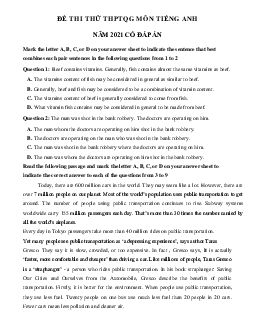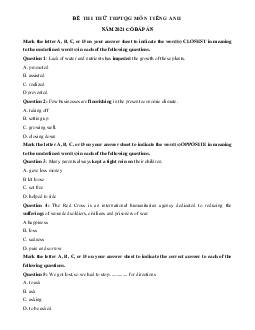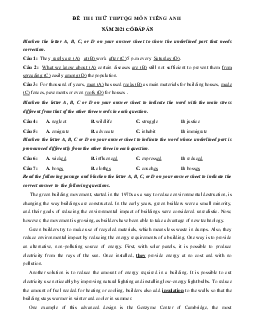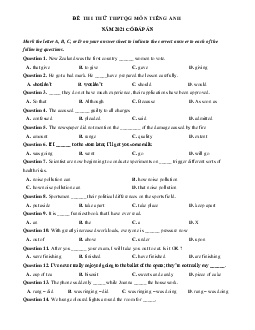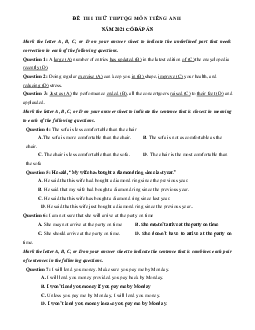








Preview text:
ĐỀ THI THỬ THPTQG MÔN TIẾNG ANH
NĂM 2021 CÓ ĐÁP ÁN
Mark the letter A, B, C, or D to indicate the word whose underlined part differs from the
three in pronunciation in each of the following questions. Question 1. A. folks B. fields C. steps D. effects
Question 2. A. temporary B. shortlist
C. afford D. accordingly
Mark the letter A, B, C, or D to indicate the word that differs from the other three in the
position of the primary stress in each of the following questions. Question 3. A. sleepy B. trophy C. facial D. exact
Question 4. A. specific B. solution C. convention D. economic
Mark the letter A, B, C, or D on your answer sheet to indicate the correct answer to each of
the following questions.
Question 5. They find it hard to teach the children because of their short attention ________. A. span B. limit C. duration D. time
Question 6. The Browns got disappointed after watching a/an _________ basketball match. A. moody B. tiring C. tame D. elate
Question 7. When the parents have died, the nuns will take ___________ the children. A. in B. with C. for D. to
Question 9. It was __________ that I got the job. I just happened to be in the right place at the right time. A. chance B. luck C. fortune D. fluke
Question 10. More than thirty people ________ evidence to the court during the four week trial. A. produced B. explained C. grant D. gave
Question 11. Finally, Tom's team lost in the competition because he is a weak and ________ leader. A. undecided B. undecidable C. indecisive D. undeciding
Question 12. We expect Linh __________ to the airport late as the plane will take in 15 minutes. A. to come B. not coming C. not to come D. coming
Question 13. Once __________ in the UK, the book will definitely win a number of words in regional book fairs. A. having published B. published
C. publishing D. is published
Question 14. My father has worked as a journalist _______.
A. for he graduated from the university B. as he had graduated from the university
C. since he graduated from the university D. because he has graduated from the university
Question 15. I ________ English for five years. I study it at school. A. learnt B. am learning
C. learn D. have been learning
Question 16. Your mother sometimes buys you a big present, __________? A. isn't she B. does she C. doesn't she D. didn't she
Question 17. If Bill loses his job at least they have Mary's income to ________ on. A. fall under B. fall back C. fall behind D. fall for
Question 18. If it __________ tomorrow, we may postpone going on in picnic. A. raining B. will main C. shall rain D. rains
Mark the letter A, B, C, or D on your answer sheet to indicate the word CLOSEST in
meaning to the underlined word in each of the following questions.
Question 19. Mr. Henderson was determined to remain neutral. A. unhurried B. uncommitted C. counterfeit D. genuine
Question 20. He decided not to buy the fake watch and wait until he had more money. A. cheap B. unattractive C. counterfeit D. genuine
Mark the letter A, B, C, or D on your answer sheet to indicate the word(s) OPPOSITE in
meaning to the underlined word(s) in each of the following questions.
Question 21. This year, due to COVID 19, the global productivity is not prolific. A. barren B. yielding C. generative D. productive
Question 22. In their company, people don't like him because he always poke his nose into other people's affairs. A. interfere B. ignore C. concern D. refrain
Mark the letter A, B, C, or D on your answer sheet to indicate the sentence that best
completes the following exchanges.
Question 23. Judie performed very well in writing lesson. Her teacher is paying her a compliment.
Teacher: "Judie, you've written a much better essay this time." Judie: “___________.” A. You're welcome. B. Writing? Why?
C. What did you say? I'm so shy.
D. Thank you. It's really encouraging
Question 24. Jenny and Jimmy are talking about university education
- Jenny: "I think having a university degree is the only way to succeed in life."
- Jimmy: “_____________. There were successful people without a degree”. A. I can't agree more B. That's life C. That's all right. D. I don't quite agree.
Read the following passage and mark the letter A, B, C or D on your answer sheet to choose
the word or phrase that best fits each other numbered blanks.
One of the most wondrous and iconic animals to walk the Earth, Bengal tigers,
(25) _________ are majestic and rare. They're also one of the biggest cat species in the world.
On average, Bengals are larger than (26) _______ tiger species, but the largest tiger ever (27)
_______ was a Siberian. As such, Bengals are considered the second largest tiger species.
Today, wild Bengal tigers are animals that only live in Bangladesh, Bhutan, India, and
Nepal. (28) _________ there are more Bengals than any other tiger subspecies on the Indian
subcontinent, the populations are endangered. Conservation efforts are working to some degree,
but they're not (29) __________ the poaching, deforestation, and human encroachment that has
devastated wild tiger habitats over the past 50 years. Question 25. A. who B. whom C. which D. that
Question 26. A. the other B. another C. others D. other Question 27. A. known B. recorded C. considered D. preserved
Question 28. A. Therefore B. Because C. Although D. However
Question 29. A. outbreaking B. outbidding C. outdancing D. outpacing
Read the following passage and mark the letter A, B, C or D on you answer sheet to indicate
the correct answer to each of the questions.
The term 'virus is derived from the Latin word for poison. or slime. It was originally applied
to the noxious stench emanating from swamps that was thought to cause a variety of diseases in
the centuries before microbes were discovered and specifically linked to illness. But it was not
until almost the end of the nineteenth century that a true virus was proven to be the cause of a disease.
The nature of viruses made them impossible to detect for many years even after bacteria
had been discovered and studied. Not only are viruses too small to be seen with a light
microscope, they also cannot be detected through their biological activity, except as it occurs in
conjunction with other organisms. In fact, viruses show no traces of biological activity by
themselves. Unlike bacteria, they are not living agents in the strictest sense Viruses are very
simple pieces of organic material composed only of nucleic acid, either DNA or RNA, enclosed
in a coat of protein made up of simple structural units (Some viruses also contain carbohydrates
and lipids.) They are parasites, requiring human, animal, or plant cells to live. The virus
replicates by attaching to a cell and injecting its nucleic acid.' once inside the cell, the DNA or
RNA that contains the virus' genetic information takes over the cell's biological machinery, and
the cell begins to manufacture viral proteins rather than its own.
Question 30. Which of the following is the best title for the passage?
A. New Developments in Viral Research
B. Understanding Viruses
C. Exploring the Causes of Disease
D. DNA Nature's Building Block
Question 31. The word "proven" in the page is meaning to which of the following. A. considered B. feared C. shown D. imagined
Question 32. The word "nature" in the passage is closest in meaning to which of the following? A. shapes B. self-sufficiency
C. characteristics D. speed
Question 33. The author implies that bacteria were investigated earlier than virus cause because ________.
A. bacteria are easier to detect
B. viruses are extremely poisonous
C. viruses are found only in hot climates
D. bacteria are harder to eradicate
Question 34. All of the following may be components of a virus EXCEPT A. plant cells B. carbohydrates C. a coat of protein D. RNA
Read the following passage and mark the letter A, B, C or D on you answer sheet to indicate
the correct answer to each of the questions.
There are three basic types of classroom learning styles: visual, auditory, and kinesthetic.
These learning styles describe the most common ways that people learn. Individuals tend to
instinctively prefer one style over the others; thus each person has a learning style that is
dominant even though he or she may also rely somewhat on the other approaches at different
times and in different circumstances. Visual learners prefer to sit somewhere in the classroom
where no obstructions hinder their view of the lesson. They rely on the teacher's facial
expressions and body language to aid theirlearning. They learn best from a blend of visual
displays and presentations such as colorful videos, diagrams, and flip-charts. Often, these
learners think in pictures and may even close their something. When they are bored, they look
around for something to watch. Many visual learners lack confidence in their auditory memory
skills and so may take detailed notes during classroom discussions and lectures. Auditory
learners sit where they can hear well. They enjoy listening and talking, so discussions and
verbal lectures stimulate them. Listening to what others have to say and then talking the subject
through helps them process new information. These learners may be heard reading to
themselves out loud because they can absorb written information better in this way. Sounding
out spelling words, reciting mathematical theories, or talking their way across a map are
examples of the types of activities that improve their understanding. Kinesthetic learners may
find it difficult to sit still in a conventional classroom. They need to be physically active and
take frequent breaks. When they are bored, they fidget in their seats. They prefer to sit
someplace where there is room to move about. They benefit from manipulating materials and
learn best when classroom subjects such as math, science, and reading are processed through
hands-on experiences. Incorporating arts-and-crafts activities, building projects, and sports into
lessons helps kinesthetic learners process new information. Physical expressions of
encouragement, such as a pat on the back, are often appreciated. In addition to these traditional
ways of describing learning styles, educators have identified other ways some students prefer to
learn. Verbal learners, for example, enjoy using words, both written and spoken. Logical
learners are strong in the areas of logic and reasoning, Social learners do best when working in
groups, whereas solitary learners prefer to work alone. Research shows that each of these
learning styles, as well as the visual, auditory, and kinesthetic styles, uses different parts of the
brain. Students may prefer to focus on just one style, but practicing other styles involves more
of the brain's potential and therefore helps students remember more of what they learn.
Question 35. What topic does the passage mainly discuss?
A. Fundamental kinds of leaning approaches
B. Different classrooms for different learner groups
C. Basic classrooms for individuals
D. The most common way to learn
Question 36. The word "obstructions” in the first paragraph is closest in meaning to _______. A. attentions B. attractiveness C. advantages D. obstacles
Question 37. According to the second paragraph, visual learners _________.
A. must keep an eye on the pictures to memorize the content of the lessons.
B. have a preference for sitting at the backs of the classrooms.
C. are not confident in remembering what they have listened.
D. are easy to get fed up with the lessons.
Question 38. The word "blend" in the passage could be best replaced by __________. A. list B. mixture C. division D. separation
Question 39. What does the word "them” in the passage refer to? A. discussions
B. auditory learners C. others D. verbal lectures
Question 40. Which of the following is NOT true about auditory learners?
A. Reciting the lessons aloud is an effective way to understand the subjects.
B. They get information and the content of the lecturers aurally and only
C. They merely learn well when they are able to listen to the lessons clearly.
D. they always fidget when they are indifferent to the lectures.
Question 41. The following are suggested methods to attract kinesthetic learners, EXCEPT _________.
A. integrating projects and sports into the lessons
B. isolating them in a customary classroom
C. stimulating them by physical expressions
D. merging arts-and-crafts activities
Question 42. According to the last paragraph, students will get the best result if they use of ________ learning. A. many styles B. tradition style C. one style D. visual style
Mark the letter A, B, C, or D on your answer sheer to indicate the underlined part that needs
correction in each of the following questions.
Question 43. Physics are one of the core subjects in natural sciences. A. Physics B. are C. subjects D. natural sciences
Question 44. The media have produced live covering of Michael Jackson's fans around the world mourning for him. A. have B. covering C. around the world D. for
Question 45. Sleeping resting and to drink fruit juice are the best ways to care for a cold. A. Sleeping B. to drink C. juice D. best ways
Mark the letter A, B, C, or D on the answer sheet to indicate the sentence that best combines
each pair of sentences in the following questions.
Question 46. It is probable to rain heavily this evening.
A. It may rain heavily this evening
B. It will be able to ruin this evening
C. It will not rain heavily this evening
D. It must rain heavily this evening
Question 47. No one in our club can speak English as fluently as Mal.
A. Mai speaks English as fluently as other people in our club.
B. Mai speaks English more fluently than no one in our club.
C. Mai is the worst English speaker in our club
D. Mai speaks English the most fluently in our club.
Question 48. "Would you like to have dinner with me?" Miss Hoa said to me.
A. Miss Hoa invited me to have dinner with her
B. Miss Hoa asked me if would like to have dinner with her?
C. Miss Haa suggested me if I would like to have dinner with her or not
D. Miss Hoa told me to like to have dinner with her or not.
Mark the letter A, B, C, or D on your answer sheet to indicate the sentence that is closest in
meaning to each of the following questions.
Question 49. He wasn't wearing a seat-belt. He was injured.
A. If he hadn't been wearing a seat-belt, he wouldn't have been injured.
B. If he had been wearing a seat-belt, he wouldn't have been injured.
C. It he had been wearing a seat-belt, he would have been injured.
D. If he had been wearing a seat-belt, he wouldn't be injured.
Question 50. John got a terminal illness. He couldn't get out of the bed on his own.
A. Such was John's illness that he could never get out of the bed on his own.
B. John's illness is too terminal for him to get out of the bed on his own.
C. Were it not for his terminal illness, John would be able to get out of bed on his own.
D. No sooner had John's illness pot terminal than he could not gel out of the bed on his own. ĐÁP ÁN 1-B 2-A 3-D 4-D 5-A 6-C 7-A 8-C 9-B 10-D 11-C 12-C 13-B 14-C 15-D 16-C 17-B 18-D 19-B 20-C 21-A 22-B 23-D 24-D 25-C 26-D 27-B 28-C 29-D 30-B 31-C 32-C 33-A 34-A 35-A 36-D 37-C 38-B 39-B 40-D 41-B 42-A 43-B 44-B 45-B 46-A 47-D 48-A 49-B 50-A
